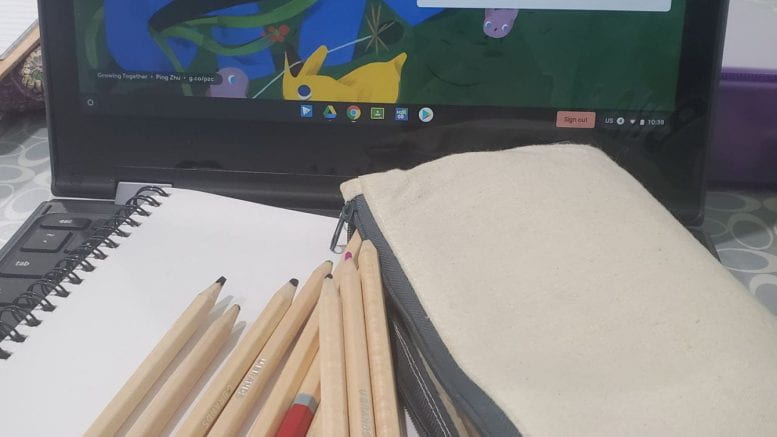The new virtual school year has brought many changes, especially in electives where some classes almost require in-person teaching and hands-on activities.
With the pandemic going on, Loudoun County Public Schools (LCPS) decided on distance learning for the first semester. However, many electives at Freedom need to be taught in class. The class may require materials that students might not have at home or would just be better with in-person classes. Some of these electives include theater, art and many of the music electives.
Many teachers had to recreate new lesson plans by being more creative and adapting to teaching all online classes. Freedom’s chorus teacher, Laura Lazarevich spend almost all summer coming up ways to adjust to this new learning curve.
“In order to sing together during a Google Meet, students mute their mics,” Lazarevich said. “Unfortunately, the audio on Google Meet does not support group singing – there is a great deal of distortion. This is the biggest adjustment for chorus students.”
“It was super easy back when we were in the classroom to go around the room and see how each student is doing and give feedback quickly,” said Julie Kang, an FHS art teacher. “It’s harder to do that when students are muted and have cameras off to know how they’re doing. There is going to be some things I will try that may end up not workout out as expected. Students in all my classes have been super awesome and have been patient with me while we are all going through this pandemic.”
Lazarevich believes it is hard to teach chorus online.
“Virtual teaching is hard because I am always multitasking – teaching, watching student screens, answering questions in the chat, having the next link ready to post in the chat, presenting a tab, presenting entire screen, sending to breakout rooms, repeat,” Lazarevich said. “It feels a bit like flying an aircraft. Not only am I the pilot, but also the flight attendant, ticketing agent, marketing, ground crew, mechanic, air traffic controller, baggage attendant and customer service rep!”
Some teachers are not able to teach certain classes to their students because of distance learning.
“I was not allowed to teach ceramics during online learning,” Kang said. “We switched the schedule so that hopefully by second semester we are back in school, even if it’s hybrid, and we can utilize the kiln, clay, glazes and pottery wheels.”
In classes like orchestra and chorus, students can’t perform in in-person concerts.
“It’s more individual work to make you a better player,” said Manmayi Ghaisas, a sophomore in orchestra. “We’re still going to learn certain pieces as a class, but this year I think it’s more personalized.”
“It has been an adjustment to teach chorus without the end goal of our traditional in person concerts, but I am working on a quarterly virtual showcase in place of live concerts and hope this may fulfill many of the same objectives,” Lazarevich said.
While these students and teachers try to adjust to their classes, issues with the internet and difficulties with technology have caused problems.
“There are also some challenges with audio or student’s internet crashing,” said Nikita Shah, a sophomore in theater. “We can’t move places when acting and sometimes there are difficulties when collaborating because of the internet.”
Overall, students and teachers in electives have seemed to adjust to their new normal.
“We are all adjusting to our new normal,” Lazarevich said. “While it is not ideal, I admire my students’ resilience and willingness to work hard and try their best. During class, we are focusing on building relationships and keeping our chorus community strong, and I think that is very important during this time that we all can feel isolated.”
